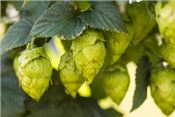Five Takeaways From The University Of Arkansas System Division Of Agriculture’s 2021 Hops Webinar

Hops are ready for harvest in a test plot at the Fruit Research Station near Clarksville.
UA System Division of Agriculture photo by Fred Miller
FAYETTEVILLE, ARK.
A three-year research and evaluation project has shown there are two varieties of hops that can be grown successfully in Arkansas, said Renee Threlfall, Arkansas Agricultural Experiment Station research scientist, during the 2021 Arkansas Hops Webinar.
Preliminary results from the study were presented during an Aug. 19 webinar by Threlfall, along with assistant professor and fruit and vegetable extension specialist Amanda McWhirt, and other experiment station and cooperative extension service faculty and staff. The experiment station and cooperative extension service are the research and extension arms of the University of Arkansas System Division of Agriculture.
The 2021 Arkansas Hops Webinar (bit.ly/ArkHopsWebinar21) was intended to provide insight into which varieties grow best in the Natural State and give updates on hop research made possible by a Specialty Crop Block Grant from the Arkansas Department of Agriculture, Threlfall said.
“The reason we’re interested in hops production is for the potential to use these hops in beer production,” McWhirt said during the webinar.
Hops are among the family Cannabaceae, and the female flower is used in brewing beer to impart bittering flavors and aromas that include floral, fruity or citric, she said.
“We really had an expansion in our craft brewing industry, McWhirt said. “We’re really interested in seeing, can we grow hops here in Arkansas that could then be supplied to local Arkansas breweries to really create a product that is grown in Arkansas and brewed in Arkansas and provides a unique product to consumers.”
5 takeaways from the 2021 Arkansas Hops webinar Although most of the hops for the nation’s craft beer industry are grown in northern states where the day length is longer, the study shows some hops can be a viable specialty crop in Arkansas that could appeal to the growing microbrewery industry in the state, McWhirt said.
Here are five key takeaways from the study so far, according to McWhirt:
• Cascade and Zeus hops varieties show the most potential in Arkansas as compared to Centennial, Crystal, Cashmere and Nugget. Preliminary data from test plots at the experiment station’s Fruit Research Station in Clarksville shows that Cascade and Zeus hops had the best yields, plant health and vigor.
• Crystal and Cashmere, also popular with American breweries, show moderate potential in Arkansas.
• Hops in Arkansas are harvested August through September.
• Cascade hops, in the second year after planting in Arkansas, had yields and alpha/beta acid levels slightly lower but comparable to commercial cultivars.
• In 2020, Cascade hops grown at the Fruit Research Station yielded about 2.6 pounds of wet hops per plant compared to 2.4 pounds for Zeus, 1.4 pounds for Crystal and 1 pound for Cashmere.
Threlfall said it is important to keep in mind the data on yields was for the second year of production and yields are expected to peak at year three, which would be the 2021 harvest. There is also more work to be done on cultivation practices, she said.
“These early years of hops research show that hops can be grown in Arkansas, especially Cascade and Zeus,” Threlfall said. “More research is needed on production practices to increase the hop yields.
We expect that initial interest in hops production will mostly be small-scale growers to supply the local microbrewing industry.” ∆